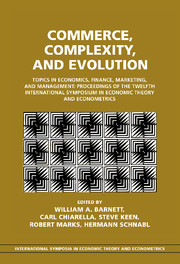 Commerce, Complexity, and Evolution
Commerce, Complexity, and Evolution Book contents
- Frontmatter
- Contents
- Series editor's preface
- Volume editors' preface
- Editors
- List of contributors
- I Philosophical and methodological implications of complexity and evolution in economic systems
- 1 Toward a generalized Coase theorem: a theory of the emergence of social and institutional structures under imperfect information
- 2 Universal Darwinism and social research: the case of economics
- 3 Uncertainty, risk, and chaos
- 4 The role of innovation in economics
- II Finance and the macroeconomy
- III Market and sectoral dynamics
- IV Marketing and interdependent behavior
4 - The role of innovation in economics
Published online by Cambridge University Press: 05 December 2011
- Frontmatter
- Contents
- Series editor's preface
- Volume editors' preface
- Editors
- List of contributors
- I Philosophical and methodological implications of complexity and evolution in economic systems
- 1 Toward a generalized Coase theorem: a theory of the emergence of social and institutional structures under imperfect information
- 2 Universal Darwinism and social research: the case of economics
- 3 Uncertainty, risk, and chaos
- 4 The role of innovation in economics
- II Finance and the macroeconomy
- III Market and sectoral dynamics
- IV Marketing and interdependent behavior
Summary
Comparative statics is a special case of dynamics in which a unique stable equilibrium is assumed to exist, and two equilibria – determined by different parameter values – are compared. Similarly, dynamics is a special case of an evolutionary process, in which the degrees of freedom of the system are held constant. Marshall, whose Principles played a large role in setting economics on the comparative statics course, was nonetheless aware of the primacy of the evolutionary paradigm when he wrote that
“the Mecca of the economist lies in economic biology rather than in economic dynamics. But biological conceptions are more complex than those of dynamics; a volume on Foundations must therefore give a relatively large place to mechanical analogies; and frequent use of the term ‘equilibrium,’ which suggest something of a statical analogy…. The modern mathematician is familiar with the notion that dynamics includes statics. If he can solve a problem dynamically, he seldom cares to solve it statically also…. But the statical solution has claims of its own. It is simpler than the dynamical; it may afford useful preparation and training for the more difficult dynamical solution; and it may be the first step towards a provisional and partial solution in problems so complex that a complete dynamical solution is beyond our attainment”
(Marshall 1920, p. xiv).At the time Marshall penned these words, Darwin's theory of evolution had captured the scientific and public imagination. It defined state-of-the-art biology at the time, but although it had enormous explanatory power, the theory had little predictive power.
- Type
- Chapter
- Information
- Commerce, Complexity, and EvolutionTopics in Economics, Finance, Marketing, and Management: Proceedings of the Twelfth International Symposium in Economic Theory and Econometrics, pp. 61 - 80Publisher: Cambridge University PressPrint publication year: 2000


